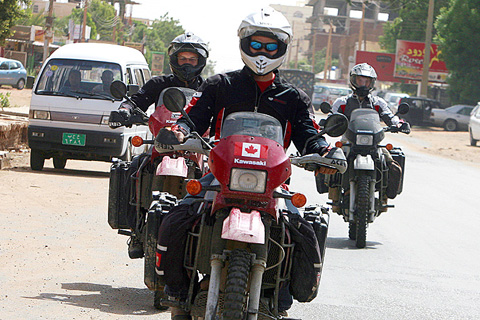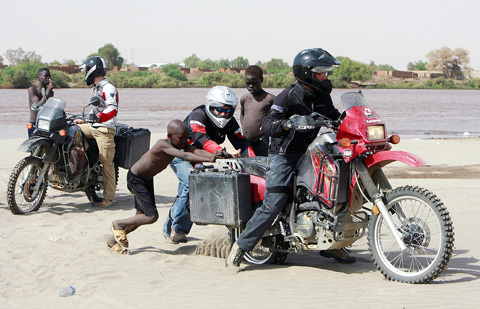After racing through spectacular desert, sleeping under the stars and enjoying boundless hospitality, three Westerners on a motorbike odyssey say they are convinced that Sudan is Africa’s next tourist paradise just waiting to be discovered.
President Omar al-Beshir may be the first sitting head of state in history to face a possible international arrest warrant for alleged genocide and war crimes, but two Canadians and an Englishman are spellbound by the country.
“I’m convinced that in a few years’ time Sudan will be right up there with the other big African countries in terms of tourist spots,” said Tom Smith, on three months’ leave from the Bank of England to bike from London to Cape Town.

PHOTO: AFP
“If it stays like this, you know, has the same appeal, then yeah — I think they’ll be flocking,” added the 25-year-old, on a pit stop in Khartoum with the desert behind them and a two-day run to the Ethiopian border ahead.
More than two years in the planning, their 24,000km ride through Europe, the Middle East, Sudan and down through Africa to the Cape is costing Smith and his Canadian mates a self-financed total of US$60,000.
Inspired by film actor Ewan McGregor and his close friend Charley Boorman who rode BMW bikes from Scotland to South Africa for a television series, the intrepid three are also raising thousands of dollars to help HIV sufferers.

PHOTO: AFP
They were apprehensive about the security situation in Sudan, bogged down in war in Darfur to the west and also trying to recover from a 21-year north-south civil war.
But such fears quickly dissipated after their arrival in Sudan by ferry from Egypt across Lake Nasser.
“The perception of this war-torn country has been the focus of the media, but the experience that we’ve had — nothing could be further from the truth,” said Tyson Brust, a 30-year-old medical student from Toronto.
“It’s probably one of the safer areas in the world, and we found that when we went through. The people were incredibly friendly — everyone was waving us in, wanting us to have breakfast with them and giving us drinks,” he added.
Such comments are music to the ears of a country slapped with US sanctions, blacklisted by Washington as a sponsor of terror and on a diplomatic offensive to save Beshir from the dock of the International Criminal Court.
After driving dirt bikes through Europe, Syria and Jordan and enduring a horrifying crash that left 32-year-old Yarema Bezchlibnyk in pain and weary of “being completely shafted” in Egypt, they say their adventure really began.
Yarema, also a medical student, described the journey from Lake Nasser to Dongola, site of a mediaeval city, as a “spectacular ride, the landscape almost lunar” with rock formations jutting from the desert and blasted by the scorching heat.
“We got into the desert. The sun started to go down and I was thinking ‘wow, I’m in Sudan riding through the desert.’ Just spectacular scenery. This is what it’s all about, this is the adventure,” added Tyson.
They expect to be in Sudan for another week. They have slept under the stars, been invited to stay overnight in village huts and rested at a guest house recommended by a friend of a friend near the UN headquarters in Khartoum.
But it has not all been plain sailing. Stomach upsets from the local cuisine have plagued their advance since Turkey. None is a trained mechanic, so just a flat tire can take half a day to repair. And the heat can be intense.
They are a week behind schedule and need to get to Cape Town in time to fly back for medical school and work. They’ve been away for a month and a half, but at 10,100km have completed only two-fifths of the route.
Smith likened one hotel they stayed in — apparently the best in town — to a POW camp with cell-like rooms where they awoke “absolutely sweltering” because the air conditioning had conked out in a power cut.
Despite having just one guidebook, they are finding their way without GPS and stumbling across tourist gems quite by chance — such as lazing under palm trees next to an ancient Egyptian temple after lunch.
Sudan’s attraction was being able to realize the dream of getting off the beaten track — the trio’s blog is at www.ditchthecomfortzone.com. But from Wadi Halfa to Dongola they also witnessed Sudan’s march to development on the back of oil profits.
“You can see that in a couple of years that (new road) is going to be finished. You won’t need any of the dirt bikes that we’ve kitted out — you can do it on anything,” said Smith.

In Taiwan there are two economies: the shiny high tech export economy epitomized by Taiwan Semiconductor Manufacturing Co (TSMC, 台積電) and its outsized effect on global supply chains, and the domestic economy, driven by construction and powered by flows of gravel, sand and government contracts. The latter supports the former: we can have an economy without TSMC, but we can’t have one without construction. The labor shortage has heavily impacted public construction in Taiwan. For example, the first phase of the MRT Wanda Line in Taipei, originally slated for next year, has been pushed back to 2027. The government

July 22 to July 28 The Love River’s (愛河) four-decade run as the host of Kaohsiung’s annual dragon boat races came to an abrupt end in 1971 — the once pristine waterway had become too polluted. The 1970 event was infamous for the putrid stench permeating the air, exacerbated by contestants splashing water and sludge onto the shore and even the onlookers. The relocation of the festivities officially marked the “death” of the river, whose condition had rapidly deteriorated during the previous decade. The myriad factories upstream were only partly to blame; as Kaohsiung’s population boomed in the 1960s, all household

Allegations of corruption against three heavyweight politicians from the three major parties are big in the news now. On Wednesday, prosecutors indicted Hsinchu County Commissioner Yang Wen-ke (楊文科) of the Chinese Nationalist Party (KMT), a judgment is expected this week in the case involving Hsinchu Mayor Ann Kao (高虹安) of the Taiwan People’s Party (TPP) and former deputy premier and Taoyuan Mayor Cheng Wen-tsan (鄭文燦) of the Democratic Progressive Party (DPP) is being held incommunicado in prison. Unlike the other two cases, Cheng’s case has generated considerable speculation, rumors, suspicions and conspiracy theories from both the pan-blue and pan-green camps.

Stepping inside Waley Art (水谷藝術) in Taipei’s historic Wanhua District (萬華區) one leaves the motorcycle growl and air-conditioner purr of the street and enters a very different sonic realm. Speakers hiss, machines whir and objects chime from all five floors of the shophouse-turned- contemporary art gallery (including the basement). “It’s a bit of a metaphor, the stacking of gallery floors is like the layering of sounds,” observes Australian conceptual artist Samuel Beilby, whose audio installation HZ & Machinic Paragenesis occupies the ground floor of the gallery space. He’s not wrong. Put ‘em in a Box (我們把它都裝在一個盒子裡), which runs until Aug. 18, invites